***
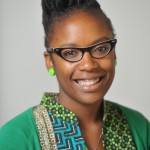 Tendayi Achiume is the Binder Clinical Teaching Fellow at the University of California, Los Angeles (UCLA) Law School, where she has co-taught the International Justice Clinic and assisted with the Asylum Clinic. Her broad research interest is Africa’s role in shaping the development of international law. Her current projects interrogate the relationship between Africa and the International Criminal Court, and the use of international human rights for refugee protection in sub-Saharan Africa. Ms. Achiume graduated from the Yale Law School in 2008 with a JD and a Graduate Certificate in Development studies from Yale University. At the Yale Law School she was the recipient of the Bernstein International Human Rights Fellowship, the Fox International Fellowship, and the Howard M. Holtzmann Fellowship in International Arbitration and Dispute Resolution. She also served as Managing Editor of Submissions for the Yale Journal of International Law. After graduation she clerked on the Constitutional Court of South Africa for Deputy Chief Justice Moseneke and Justice Mokgoro.
Tendayi Achiume is the Binder Clinical Teaching Fellow at the University of California, Los Angeles (UCLA) Law School, where she has co-taught the International Justice Clinic and assisted with the Asylum Clinic. Her broad research interest is Africa’s role in shaping the development of international law. Her current projects interrogate the relationship between Africa and the International Criminal Court, and the use of international human rights for refugee protection in sub-Saharan Africa. Ms. Achiume graduated from the Yale Law School in 2008 with a JD and a Graduate Certificate in Development studies from Yale University. At the Yale Law School she was the recipient of the Bernstein International Human Rights Fellowship, the Fox International Fellowship, and the Howard M. Holtzmann Fellowship in International Arbitration and Dispute Resolution. She also served as Managing Editor of Submissions for the Yale Journal of International Law. After graduation she clerked on the Constitutional Court of South Africa for Deputy Chief Justice Moseneke and Justice Mokgoro.
Ms. Achiume worked at Lawyers for Human Rights (LHR) in its Johannesburg Refugee and Migrant Rights Programme. In addition to providing direct legal services to refugees and migrants from across the continent, she was also involved in various advocacy projects particularly on issues relating to Zimbabwean refugees and migrants in South Africa. While in South Africa Ms. Achiume taught international human rights at Witwatersrand University in Johannesburg and conducted refugee protection research at the University of Cape Town.
Prior to joining UCLA, Ms. Achiume practiced as a litigation associate at Sullivan & Cromwell LLP in New York, where she is a member of the State Bar. She graduated with distinction from Yale College in 2005 with a B.A. in Ethics, Politics and Economics.
***
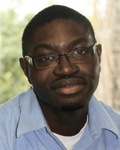 Dapo Akande is University Lecturer in Public International Law (equivalent to a US tenured professor) and Co-Director of the Oxford Institute for Ethics, Law and Armed Conflict at the University of Oxford. He is the current Convenor of the Oxford Law Faculty’s Public International Law Group and Yamani Fellow at St. Peter’s College, Oxford. In 2008/09 he was Visiting Associate Professor and Robinna Foundation International Fellow at Yale Law School. In 2002 and 2009, he was Visiting Professor at the University of Miami School of Law. Before moving to Oxford in 2004, Dapo held faculty positions at other leading law schools in the UK. From 1998 to 2000, he had a tenure track position at the University of Nottingham School of Law and from 2000 to 2004 he was at the University of Durham. From 1994 to 1998, he taught (part-time), first at the London School of Economics and then at Christ’s College and Wolfson College, Cambridge.
Dapo Akande is University Lecturer in Public International Law (equivalent to a US tenured professor) and Co-Director of the Oxford Institute for Ethics, Law and Armed Conflict at the University of Oxford. He is the current Convenor of the Oxford Law Faculty’s Public International Law Group and Yamani Fellow at St. Peter’s College, Oxford. In 2008/09 he was Visiting Associate Professor and Robinna Foundation International Fellow at Yale Law School. In 2002 and 2009, he was Visiting Professor at the University of Miami School of Law. Before moving to Oxford in 2004, Dapo held faculty positions at other leading law schools in the UK. From 1998 to 2000, he had a tenure track position at the University of Nottingham School of Law and from 2000 to 2004 he was at the University of Durham. From 1994 to 1998, he taught (part-time), first at the London School of Economics and then at Christ’s College and Wolfson College, Cambridge.
He has varied research interests within the field of general international law and has published articles on aspects of the law of international organizations, international dispute settlement , international criminal law and the law of armed conflict. His articles have been published in leading international law journals such as the American Journal of International Law, the British Yearbook of International Law and the European Journal of International Law . His article in the Journal of International Criminal Justice on the “Jurisdiction of the International Criminal Court over Nationals of Non-Parties: Legal Basis and Limits” was awarded the 2003 Giorgio La Pira Prize.
Dapo has advised States and international organizations on matters of international law. He has advised and assisted counsel or provided expert opinions in cases before the International Court of Justice, the International Tribunal for the Law of the Sea, international arbitral tribunals, WTO and NAFTA Dispute Settlement Panels as well as cases in England and the United States of America. He has acted as Consultant for the African Union on the international criminal court and on the law relating to terrorism. He has also provided training on international law to diplomats, military officers and other government officials.
In addition to being editor of EJIL:Talk! (the blog of the European Journal of International Law), he is a member of the boards of a number of journals, academic and professional organizations, including: the Scientific Advisory Board of the European Journal of International Law; the Editorial Board of the African Journal of International and Comparative Law; the Advisory Council of the British Institute of International and Comparative Law; the Executive Council of the British Branch of the International Law Association; the Advisory Board of the International Centre for Transitional Justice and the Advisory Committee of International Lawyers for Africa.
***
 Cecile Aptel is the Senior Legal Policy Adviser in the Executive Direction of the Office of the UN High Commissioner for Human Rights. She is also Associate Professor of International Law at Tufts’ Fletcher School of Law and Diplomacy. From 2007 until 2010, she led the International Center for Transitional Justice’s Program on Children, and served as an expert or consultant for several other international and non-governmental organisations. She was the Head of the Legal Advisory Section, UN International Independent Investigation Commission – ‘Hariri Commission’ (Beirut, 2006); and Auditor for the UN Office of Internal Oversight Services (Nairobi, 2005); Convener of the Court of Bosnia-Herzegovina (Sarajevo, 2005). She worked for the International Criminal Tribunals for the former Yugoslavia and Rwanda from 1996 until 2005, serving in different legal and policy positions. In 2010, she was awarded a Jennings Randolph Senior Fellowship by the United States Institute of Peace.
Cecile Aptel is the Senior Legal Policy Adviser in the Executive Direction of the Office of the UN High Commissioner for Human Rights. She is also Associate Professor of International Law at Tufts’ Fletcher School of Law and Diplomacy. From 2007 until 2010, she led the International Center for Transitional Justice’s Program on Children, and served as an expert or consultant for several other international and non-governmental organisations. She was the Head of the Legal Advisory Section, UN International Independent Investigation Commission – ‘Hariri Commission’ (Beirut, 2006); and Auditor for the UN Office of Internal Oversight Services (Nairobi, 2005); Convener of the Court of Bosnia-Herzegovina (Sarajevo, 2005). She worked for the International Criminal Tribunals for the former Yugoslavia and Rwanda from 1996 until 2005, serving in different legal and policy positions. In 2010, she was awarded a Jennings Randolph Senior Fellowship by the United States Institute of Peace.
Since 2008, she is the Co-Chair of the International Bar Association’s War Crimes Committee. Prof. Aptel has made several appearances on the BBC and Al Jazeera English, and been quoted notably by CNN and Christian Science Monitor.
***
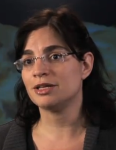 Aslı Ü. Bâli is Assistant Professor of Law at the UCLA School of Law. She teaches Public International Law, International Human Rights and a seminar on the Laws of War. She joined the UCLA faculty from the Yale Law School where she served as the Irving S. Ribicoff Fellow in Law and Coordinator of the Middle East Legal Forum. A graduate of Williams College, Cambridge University, where she was a Herchel Smith Scholar, and the Yale Law School, Bâli also hold a Ph.D. from the Department of Politics at Princeton University.
Aslı Ü. Bâli is Assistant Professor of Law at the UCLA School of Law. She teaches Public International Law, International Human Rights and a seminar on the Laws of War. She joined the UCLA faculty from the Yale Law School where she served as the Irving S. Ribicoff Fellow in Law and Coordinator of the Middle East Legal Forum. A graduate of Williams College, Cambridge University, where she was a Herchel Smith Scholar, and the Yale Law School, Bâli also hold a Ph.D. from the Department of Politics at Princeton University.
After graduating from law school, Bâli practiced law with the law firm of Cleary, Gottlieb, Steen & Hamilton in New York and Paris, where, in addition to representing a variety of corporate clients, she engaged in extensive pro bono work relating to immigration, civil liberties, and international human rights. In addition, Bâli has previously held positions at the United Nations Office of the High Commissioner for Human Rights and the Middle East North Africa Division of the World Bank. She currently serves as an Advisory Committee member of the Middle East and North Africa Division of Human Rights Watch.
Professor Bâli’s research interests focus on public international law generally, including the intersection of international law and international relations, as well as issues of non-proliferation, human rights and humanitarian law. She also has a strong interest in the comparative law of the Middle East. Recent work includes The Paradox of Judicial Independence: Constitutional Transition and the Turkish Example (Virginia Journal of International Law, Vol. 52(2), 2012); Beyond Legality and Legitimacy: Intervention and the Eroding Norm of Nonproliferation (Oxford University Press, 2012); Pax Arabica: Provisional Sovereignty and Intervention in the Arab Uprisings (California Western International Law Journal, 2012); American Overreach: Strategic Interests and Millennial Ambitions in the Middle East, (Geopolitics Vol. 15(2), 2010); and From Subjects to Citizens? The Shifting Paradigm of Electoral Authoritarianism in the Middle East, published in Middle East Law and Governance(2009).
***
 Philippe Bolopion joined Human Rights Watch as United Nations Director in August 2010. Prior to that, he spent five years working with the French daily Le Monde as the UN correspondent. There he covered a wide range of UN issues and traveled to such places as Darfur, eastern Democratic Republic of Congo, Sri Lanka, Gaza, and Haiti, including on missions with UN secretary-generals and the UN Security Council. He has also worked as a journalist covering the United Nations for France 24 and Radio France International (RFI). Prior to working in New York, Bolopion was based in Pristina, where he reported on the end of the Kosovo Conflict in 1999 and 2000. Bolopion is the author of Le bagne du bout du monde (La Découverte, 2004). He is a graduate of the Institut d’Etudes Politiques (IEP) de Bordeaux and CUEJ, the journalism school of Strasbourg.
Philippe Bolopion joined Human Rights Watch as United Nations Director in August 2010. Prior to that, he spent five years working with the French daily Le Monde as the UN correspondent. There he covered a wide range of UN issues and traveled to such places as Darfur, eastern Democratic Republic of Congo, Sri Lanka, Gaza, and Haiti, including on missions with UN secretary-generals and the UN Security Council. He has also worked as a journalist covering the United Nations for France 24 and Radio France International (RFI). Prior to working in New York, Bolopion was based in Pristina, where he reported on the end of the Kosovo Conflict in 1999 and 2000. Bolopion is the author of Le bagne du bout du monde (La Découverte, 2004). He is a graduate of the Institut d’Etudes Politiques (IEP) de Bordeaux and CUEJ, the journalism school of Strasbourg.
***
 Federico Borello is currently Director of Investments at Humanity United, a private foundation where he is in charge of the Democratic Republic of Congo and International Justice portfolios. He has more than a decade of experience with international organizations, including the UnitedNations, the Organization for Security and Co-operation in Europe (OSCE) and the International Center for Transitional Justice (ICTJ). With the United Nations, he was the coordinator of the Transitional Justice and Anti-Impunity Unit at MONUC, the UN mission in Congo, between 2005 and 2009. He later joined the UN Mapping Team in Congo as investigations coordinator and legal advisor, the UN Commission of Experts in Guinea as legal advisor, and the United Nations Development Program (UNDP) in Burundi to finalize a report on transitional justice. With ICTJ, between 2002 and 2005, he worked on several transitional justice situations, including supporting the Moroccan Truth Commission from2003-2005. Federico previously worked for the UN High Commissioner for Human Rights in Rwanda and Cambodia, and with the OSCE in Bosnia and Croatia.
Federico Borello is currently Director of Investments at Humanity United, a private foundation where he is in charge of the Democratic Republic of Congo and International Justice portfolios. He has more than a decade of experience with international organizations, including the UnitedNations, the Organization for Security and Co-operation in Europe (OSCE) and the International Center for Transitional Justice (ICTJ). With the United Nations, he was the coordinator of the Transitional Justice and Anti-Impunity Unit at MONUC, the UN mission in Congo, between 2005 and 2009. He later joined the UN Mapping Team in Congo as investigations coordinator and legal advisor, the UN Commission of Experts in Guinea as legal advisor, and the United Nations Development Program (UNDP) in Burundi to finalize a report on transitional justice. With ICTJ, between 2002 and 2005, he worked on several transitional justice situations, including supporting the Moroccan Truth Commission from2003-2005. Federico previously worked for the UN High Commissioner for Human Rights in Rwanda and Cambodia, and with the OSCE in Bosnia and Croatia.
***
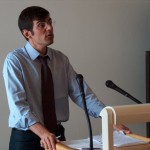 David Donat Cattin (Ph.D Law, Italy) is the Senior Director of the International Law and Human Rights Programme at Parliamentarians for Global Action (PGA). Over the last twelve years, Dr. Donat Cattin worked to promote the universality and effectiveness of the International Criminal Court (ICC) Statute in approximately 100 countries. With his assistance, PGA Members contributed to the ratification process of 75 out the current 121 States Parties to the Rome Statute, including the ratifications/accessions by Japan (2007), The Philippines, The Maldives, Cape Verde and Vanuatu (2011).
David Donat Cattin (Ph.D Law, Italy) is the Senior Director of the International Law and Human Rights Programme at Parliamentarians for Global Action (PGA). Over the last twelve years, Dr. Donat Cattin worked to promote the universality and effectiveness of the International Criminal Court (ICC) Statute in approximately 100 countries. With his assistance, PGA Members contributed to the ratification process of 75 out the current 121 States Parties to the Rome Statute, including the ratifications/accessions by Japan (2007), The Philippines, The Maldives, Cape Verde and Vanuatu (2011).
Dr. Donat Cattin holds a Ph.D in Public International Law (2000) from the University of Teramo (Italy), Faculty of Law, and a ‘magna cum laude’ law degree (1994) from the LUISS-Guido Carli University (Rome, Italy). His writings on international criminal law appeared on well known scholarly works, such as Triffterer’s “Commentary on the Rome Statute of the ICC” (I ed. 1999; II ed. 2008; upcoming III ed. 2013) and Lattanzi/Schabas “Essays on the Rome Statute of the ICC” (vol. I, 1999; vol. II, 2004). Since May 2012, he is an “Adjunct Assistant Professor” of International Law at New York University (NYU) Center for Global Affairs. Since August 1999, he is a lecturer at the summer programme of the Salzburg Law School on Int. Criminal Law, Faculty of Law, University of Salzburg (Austria).
Among the academic institutions in which he gave presentations and lectures, it is noteworthy to mention the University of Botswana in Gaborone, the Brazilian Institute of Criminal Sciences (IBCCRIM) in Sao Paulo, Frei Univ. and Humboldt Univ. in Berlin (Germany), the Italian Society of International Organisation (SIOI), the TMC Asser Institute for International Law in The Hague and the Hague Academy of International Law (The Netherlands), the Faculty of Law of Cambridge University (UK), the City University of New York and NYU School of Law (USA). He has been heard as expert-witness on the ICC and its impact on conflicts in Africa by the German Bundestag, Committee on Human Rights and Humanitarian Affairs (Sept. 2007) and on the situation in Darfur by the Italian Chamber of Deputies, Sub-Committee on Human Rights (Dec. 2008 and Feb. 2009). He also intervened on the ICC and the fight against impunity in the European Parliament, Sub-Committee on Human Rights (April 2010) and in the plenary of the Africa-Caribbean-Pacific—European Union Joint Parliamentary Assembly (March 2008).
Dr. Donat Cattin has been intervened in a number of international media on international criminal justice issues. These media include: BBC World Service, Reuters, Al-Jazeera (Eng), Deutche Welle, Radio Netherlands Worldwide (RNW), Sky TG 24, Radiotelevisione Svizzera Italiana (RSI), Inter-Press Service, Institute for War and Peace Reporting.
Languages: English (fluent), Italian (native), French and Spanish (fair).
***
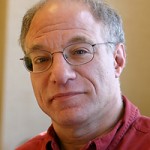 Richard Dicker, director of Human Rights Watch’s international justice program since it was founded in 2001, has worked at Human Rights Watch since 1991. He started working on international justice issues in 1994 when Human Rights Watch attempted to bring a case before the International Court of Justice charging the government of Iraq with genocide against the Kurds. Dicker later led the Human Rights Watch multi-year campaign to establish the International Criminal Court (ICC). He continues to be closely involved on issues that are important at the ICC. He has also spent the past few years leading advocacy efforts urging the creation of effective accountability mechanisms. He monitored the Slobodan Milosevic trial in The Hague and made many trips to Iraq before and at the start of Saddam Hussein’s trial. A former civil rights attorney in New York, Dicker graduated from New York University Law School and received his LLM from Columbia University.
Richard Dicker, director of Human Rights Watch’s international justice program since it was founded in 2001, has worked at Human Rights Watch since 1991. He started working on international justice issues in 1994 when Human Rights Watch attempted to bring a case before the International Court of Justice charging the government of Iraq with genocide against the Kurds. Dicker later led the Human Rights Watch multi-year campaign to establish the International Criminal Court (ICC). He continues to be closely involved on issues that are important at the ICC. He has also spent the past few years leading advocacy efforts urging the creation of effective accountability mechanisms. He monitored the Slobodan Milosevic trial in The Hague and made many trips to Iraq before and at the start of Saddam Hussein’s trial. A former civil rights attorney in New York, Dicker graduated from New York University Law School and received his LLM from Columbia University.
***
 Joseph DiMento is a member of the founding faculty of UC Irvine School of LawIn his decades as a professor, DiMento has written 11 books and taught courses on a wide variety of subjects, including urban and regional planning, domestic and international environmental law, administrative law and regulation, business and government, and conflict resolution. In 2008, he became a founding faculty member at the UC Irvine School of Law, where he taught the inaugural class in an innovative course on methods of legal analysis in international law. He is a prolific contributor to academic journals, including Duke Law Journal, the UCLA Journal of Environmental Law and Policy, the Journal of Environmental Law and Litigation, Ecology Law Quarterly, Natural Resources Lawyer, Journal of Urban Law, Duke Law Journal, Land Use and Environmental Law Review, Zoning and Planning Law Report, Michigan Bar Journal, Journal of Environmental Systems, Journal of Social Issues, Georgetown International Environmental Law Review and many others. He also has been published in The New York Times, the Los Angeles Times, the Christian Science Monitor and other publications.
Joseph DiMento is a member of the founding faculty of UC Irvine School of LawIn his decades as a professor, DiMento has written 11 books and taught courses on a wide variety of subjects, including urban and regional planning, domestic and international environmental law, administrative law and regulation, business and government, and conflict resolution. In 2008, he became a founding faculty member at the UC Irvine School of Law, where he taught the inaugural class in an innovative course on methods of legal analysis in international law. He is a prolific contributor to academic journals, including Duke Law Journal, the UCLA Journal of Environmental Law and Policy, the Journal of Environmental Law and Litigation, Ecology Law Quarterly, Natural Resources Lawyer, Journal of Urban Law, Duke Law Journal, Land Use and Environmental Law Review, Zoning and Planning Law Report, Michigan Bar Journal, Journal of Environmental Systems, Journal of Social Issues, Georgetown International Environmental Law Review and many others. He also has been published in The New York Times, the Los Angeles Times, the Christian Science Monitor and other publications.
***
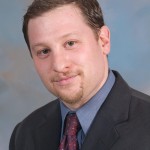 Joshua Eisenman is senior fellow for China studies at the American Foreign Policy Council (AFPC) in Washington, DC and a teaching fellow and PhD candidate in political science at UCLA. During the 2011-12 academic year he taught Chinese politics and economics at New York University-Shanghai. Before joining the AFPC in 2005 and UCLA in 2006, he served for over two years as a professional policy analyst on the staff of the Congressionally-mandated U.S.-China Economic and Security Review Commission. He has also worked as fellow at the New America Foundation and assistant director of China studies at The Center for the National Interest, in Washington, DC. In June 2012, together with Ambassador David H. Shinn, he published his second book entitled China and Africa: A Century of Engagement (University of Pennsylvania Press). In 2007 Mr. Eisenman, together with Kurt Campbell, Derek Mitchell and Eric Heginbotham, co-edited China and the Developing World: Beijing’s Strategy for the 21st Century (ME Sharpe).
Joshua Eisenman is senior fellow for China studies at the American Foreign Policy Council (AFPC) in Washington, DC and a teaching fellow and PhD candidate in political science at UCLA. During the 2011-12 academic year he taught Chinese politics and economics at New York University-Shanghai. Before joining the AFPC in 2005 and UCLA in 2006, he served for over two years as a professional policy analyst on the staff of the Congressionally-mandated U.S.-China Economic and Security Review Commission. He has also worked as fellow at the New America Foundation and assistant director of China studies at The Center for the National Interest, in Washington, DC. In June 2012, together with Ambassador David H. Shinn, he published his second book entitled China and Africa: A Century of Engagement (University of Pennsylvania Press). In 2007 Mr. Eisenman, together with Kurt Campbell, Derek Mitchell and Eric Heginbotham, co-edited China and the Developing World: Beijing’s Strategy for the 21st Century (ME Sharpe).
***
 Judge Silvia Fernández de Gurmendi has over 20 years practice of international and humanitarian law and in human rights. Coming to the Court from the Ministry of Foreign Affairs where she was the Director General for Human Rights, Judge Fernández de Gurmendi acted as a representative of Argentina in cases before the Inter American Commission of Human Rights and the Inter American Court of Justice. She also represented Argentina before universal and regional human rights bodies and advised on transitional justice issues related to the prevention of genocide and other international crimes. Judge Fernández de Gurmendi contributed to the creation and set up of the Court. She was also instrumental in the negotiations of the complementary instruments of the Rome Statute as chair of the Working Group on Rules of Procedure and Evidence and the Working Group on Aggression. Her academic experience includes professorships of international criminal law at the universities of Buenos Aires and Palermo and as an assistant professor of international law at the University of Buenos Aires. Judge Fernández de Gurmendi has also published a number of national and international publications related to the International Criminal Court including, amongst others, the role of the Prosecutor, criminal procedure, and the definitions of victims.
Judge Silvia Fernández de Gurmendi has over 20 years practice of international and humanitarian law and in human rights. Coming to the Court from the Ministry of Foreign Affairs where she was the Director General for Human Rights, Judge Fernández de Gurmendi acted as a representative of Argentina in cases before the Inter American Commission of Human Rights and the Inter American Court of Justice. She also represented Argentina before universal and regional human rights bodies and advised on transitional justice issues related to the prevention of genocide and other international crimes. Judge Fernández de Gurmendi contributed to the creation and set up of the Court. She was also instrumental in the negotiations of the complementary instruments of the Rome Statute as chair of the Working Group on Rules of Procedure and Evidence and the Working Group on Aggression. Her academic experience includes professorships of international criminal law at the universities of Buenos Aires and Palermo and as an assistant professor of international law at the University of Buenos Aires. Judge Fernández de Gurmendi has also published a number of national and international publications related to the International Criminal Court including, amongst others, the role of the Prosecutor, criminal procedure, and the definitions of victims.
***
 James A. Goldston is the founding Executive Director of the Open Society Justice Initiative, an operational arm of the Soros foundations network that promotes rights-based law reform worldwide. The Justice Initiative pursues international litigation, advocacy and research to address a wide range of problems, including mass atrocity crimes, statelessness, barriers to free expression, excessive pre-trial detention, and corruption linked to exploitation of natural resources.
James A. Goldston is the founding Executive Director of the Open Society Justice Initiative, an operational arm of the Soros foundations network that promotes rights-based law reform worldwide. The Justice Initiative pursues international litigation, advocacy and research to address a wide range of problems, including mass atrocity crimes, statelessness, barriers to free expression, excessive pre-trial detention, and corruption linked to exploitation of natural resources.
In 2007-08, Goldston served as Coordinator of Prosecutions and Senior Trial Attorney at the Office of the Prosecutor of the International Criminal Court in The Hague, where he oversaw litigation in all cases involving the Office of the Prosecutor, and helped prepare the arrest warrant application for President Omar Al Bashir of Sudan. Previously, as Legal Director of the Budapest-based European Roma Rights Center, Goldston spearheaded the development of ground-breaking civil rights cases before the European Court of Human Rights, United Nations treaty bodies, and domestic courts in 15 European countries. He was lead counsel in the decade-long litigation culminating in the landmark 2007 judgment of the Grand Chamber of the European Court of Human Rights in DH v. Czech Republic, which for the first time found a nationwide systemic practice of discrimination in breach of the European Convention.
Goldston has also served as Assistant United States Attorney in the Southern District of New York, Director General for Human Rights of the Mission to Bosnia-Herzegovina of the Organization for Security and Cooperation in Europe, researcher for Human Rights Watch, and Lecturer in Law at Columbia Law School.
***
 David Kaye recently joined the faculty at the UC Irvine School of Law, the newest law school in the University of California system, where he will direct the International Justice Clinic and teach other subjects in international law. Previously he was the founding Executive Director of the UCLA School of Law International Human Rights Program, where he taught international human rights law and directed the International Justice Clinic. David has taught courses in public international law, international humanitarian law and human rights at Georgetown University, Whittier Law School, and summer courses at the Universities of Toulouse and Amsterdam. From 1995 to 2005, he served as an international lawyer with the State Department, responsible for issues as varied as human rights, international humanitarian law, the use of force, international organizations, and U.S. foreign relations law. He was also a legal adviser to the American Embassy in The Hague.
David Kaye recently joined the faculty at the UC Irvine School of Law, the newest law school in the University of California system, where he will direct the International Justice Clinic and teach other subjects in international law. Previously he was the founding Executive Director of the UCLA School of Law International Human Rights Program, where he taught international human rights law and directed the International Justice Clinic. David has taught courses in public international law, international humanitarian law and human rights at Georgetown University, Whittier Law School, and summer courses at the Universities of Toulouse and Amsterdam. From 1995 to 2005, he served as an international lawyer with the State Department, responsible for issues as varied as human rights, international humanitarian law, the use of force, international organizations, and U.S. foreign relations law. He was also a legal adviser to the American Embassy in The Hague.
David writes for legal publications on international humanitarian law, human rights, international justice and the use of force, and has published essays and op-eds in such publications as Foreign Affairs, The New York Times, The Los Angeles Times, International Herald Tribune, Foreign Policy, and The San Francisco Chronicle. He is a member of the Council on Foreign Relations, the Executive Council of the American Society of International Law, the Pacific Council on International Policy, the California South Committee of Human Rights Watch, and the Board of Directors of the Democracy Council of California.
***
 Alexander Khodakov was born in Moscow, Russia. He is the External Relations and Cooperation Senior Advisor at the Registry of the ICC. Before joining the ICC in September 2011, he worked at the Organization for the Prohibition of Chemical Weapons (OPCW) for 7 years. He is a Russian national career diplomat and was the Ambassador Extraordinary and Plenipotentiary to the Kingdom of the Netherlands from 1998 to 2003. Mr. Khodakov is married and has two children.
Alexander Khodakov was born in Moscow, Russia. He is the External Relations and Cooperation Senior Advisor at the Registry of the ICC. Before joining the ICC in September 2011, he worked at the Organization for the Prohibition of Chemical Weapons (OPCW) for 7 years. He is a Russian national career diplomat and was the Ambassador Extraordinary and Plenipotentiary to the Kingdom of the Netherlands from 1998 to 2003. Mr. Khodakov is married and has two children.
***
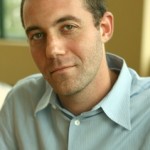 Michael Kleinman is a director on the Investments team at Humanity United. Prior to joining Humanity United, Michael spent a number of years overseas working for international NGOs—first with CARE in Afghanistan, Sudan, and in a regional position covering east and central Africa, and then with International Relief and Development in Iraq. Prior to going overseas, he worked for the Harvard Program on Humanitarian Policy and Conflict Research, leading a project on the application of international humanitarian law to the Israeli-Palestinian conflict. He is a graduate of Yale University and Harvard Law School.
Michael Kleinman is a director on the Investments team at Humanity United. Prior to joining Humanity United, Michael spent a number of years overseas working for international NGOs—first with CARE in Afghanistan, Sudan, and in a regional position covering east and central Africa, and then with International Relief and Development in Iraq. Prior to going overseas, he worked for the Harvard Program on Humanitarian Policy and Conflict Research, leading a project on the application of international humanitarian law to the Israeli-Palestinian conflict. He is a graduate of Yale University and Harvard Law School.
***
 Béatrice Le Fraper du Hellen is legal adviser to the French Mission to the United Nations. Previously she served as the Head of the Jurisdiction Complementarity and Cooperation Division of the Office of The Prosecutor (OTP) at the International Criminal Court.
Béatrice Le Fraper du Hellen is legal adviser to the French Mission to the United Nations. Previously she served as the Head of the Jurisdiction Complementarity and Cooperation Division of the Office of The Prosecutor (OTP) at the International Criminal Court.
***
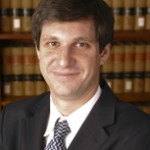 Maximo Langer is Professor of Law at UCLA School of Law where he teaches and writes on domestic, comparative and international criminal law and procedure. He has also been a visiting professor at the University Torcuato DiTella School of Law in Argentina, Harvard Law School, NYU School of Law, and the School of Law of Aix-Marseille University in France. He regularly lectures in Asia, Europe, Latin America and the United States on criminal law and procedure issues. His work has received awards from the American Society of Comparative Law, the American Society of International Law, and the Latin American Studies Association, and has been translated to Chinese, German and Spanish. He is also a member of the Executive Board of the American Journal of Comparative Law and was the first director of the UCLA Center for Argentina, Chile and the Southern Cone (2008-09).
Maximo Langer is Professor of Law at UCLA School of Law where he teaches and writes on domestic, comparative and international criminal law and procedure. He has also been a visiting professor at the University Torcuato DiTella School of Law in Argentina, Harvard Law School, NYU School of Law, and the School of Law of Aix-Marseille University in France. He regularly lectures in Asia, Europe, Latin America and the United States on criminal law and procedure issues. His work has received awards from the American Society of Comparative Law, the American Society of International Law, and the Latin American Studies Association, and has been translated to Chinese, German and Spanish. He is also a member of the Executive Board of the American Journal of Comparative Law and was the first director of the UCLA Center for Argentina, Chile and the Southern Cone (2008-09).
Professor Langer received his LL.B. from the University of Buenos Aires Law School (1995), where he was editor of the University of Buenos Aires Law Review, was awarded the Fundación Universitaria del Rio de la Plata Fellowship and graduated in the top 1% of his class. He entered the LL.M. program at Harvard Law School in 1998 and then switched to the S.J.D. program. At Harvard, he was awarded several fellowships, including the Edmond J. Safra Graduate Fellowship in Ethics from the Harvard University Center for Ethics, a Fellowship of the Center for Studies and Research in International Law and International Relations from The Hague Academy of International Law, and the Fulbright Fellowship.Before leaving Argentina for Harvard, Professor Langer served as a legal clerk in Argentinean Federal District Court No. 2 (1993-1994), and worked in white-collar criminal law litigation with Gottheil & Asociados in Buenos Aires (1994-1998). He also served as director of the Non-Conventional Offenses Program at the Institute for Comparative Studies in Criminal and Social Sciences (1997-1998) and worked as legal advisor to the Commissions of Justice and Criminal Law under Argentinean Congressman Jose Cafferata Nores (1998).
* * *
 Paul McKell is the Legal Counsellor at the United Kingdom Mission to the United Nations in New York. He has been a Legal Adviser at the Foreign and Commonwealth Office since 1997, dealing with the full range of issues on international law, EU law and human rights. He was posted at the UK Permanent Representation to the European Union in Brussels for three years (2001-2004) and was seconded to the Attorney General’s Office in the UK, as Deputy Director (International Law), for three years (2005-2008). Prior to joining the Foreign and Commonwealth Office her worked in private practice as a commercial litigator and also taught Public International Law at the University of Strathclyde in Scotland.
Paul McKell is the Legal Counsellor at the United Kingdom Mission to the United Nations in New York. He has been a Legal Adviser at the Foreign and Commonwealth Office since 1997, dealing with the full range of issues on international law, EU law and human rights. He was posted at the UK Permanent Representation to the European Union in Brussels for three years (2001-2004) and was seconded to the Attorney General’s Office in the UK, as Deputy Director (International Law), for three years (2005-2008). Prior to joining the Foreign and Commonwealth Office her worked in private practice as a commercial litigator and also taught Public International Law at the University of Strathclyde in Scotland.
***
 Diane Orentlicher, Professor of International Law at American University, has been described by the Washington Diplomat as “one of the world’s leading authorities on human rights law and war crimes tribunals.” She has lectured and published widely on issues of transitional justice, international criminal law and other areas of public international law, and has testified before the United States Senate and House on a range of issues relating to both domestic human rights laws and U.S. foreign policy. Professor Orentlicher has served in various public positions, including as the Deputy for War Crimes Issues in the U.S. Department of State (2009-2011); United Nations Independent Expert on Combating Impunity (on appointment by the UN Secretary-General) and Special Advisor to the High Commissioner on National Minorities of the Organization for Security and Co-operation in Europe (on secondment from the U.S. Department of State).
Diane Orentlicher, Professor of International Law at American University, has been described by the Washington Diplomat as “one of the world’s leading authorities on human rights law and war crimes tribunals.” She has lectured and published widely on issues of transitional justice, international criminal law and other areas of public international law, and has testified before the United States Senate and House on a range of issues relating to both domestic human rights laws and U.S. foreign policy. Professor Orentlicher has served in various public positions, including as the Deputy for War Crimes Issues in the U.S. Department of State (2009-2011); United Nations Independent Expert on Combating Impunity (on appointment by the UN Secretary-General) and Special Advisor to the High Commissioner on National Minorities of the Organization for Security and Co-operation in Europe (on secondment from the U.S. Department of State).
Professor Orentlicher is a frequent commentator on television and in the print media on issues relating to war crimes trials and other issues of transitional justice. She has appeared on various news programs on NBC, ABC, BBC, CNN, NPR, PBS, MSNBC and other broadcast stations, and has published opinion pieces and been quoted in the New York Times, the Washington Post, the International Herald Tribune and other papers.
***
 William R. Pace has served as the Convenor of the Coalition for an International Criminal Court since its founding in 1995. He is the Executive Director of the World Federalist Movement-Institute for Global Policy (WFM-IGP) and is a co-founder and steering committee member of the International Coalition for the Responsibility to Protect. He has been engaged in international justice, rule of law, environmental law, and human rights for the past 30 years. He previously served as the Secretary-General of the Hague Appeal for Peace and the Director of the Center for the Development of International Law, among other positions. He is the President of the Board of the Center for United Nations Reform Education as well as the co-founder of the NGO Working Group on the United Nations Security Council. Mr. Pace was awarded the Human Rights Medal from the Urban Morgan Institute for Human Rights for his achievements in the establishment of the ICC. He has authored numerous articles and reports on international justice, international affairs and UN issues, multilateral treaty processes, and civil society participation in international decision-making.
William R. Pace has served as the Convenor of the Coalition for an International Criminal Court since its founding in 1995. He is the Executive Director of the World Federalist Movement-Institute for Global Policy (WFM-IGP) and is a co-founder and steering committee member of the International Coalition for the Responsibility to Protect. He has been engaged in international justice, rule of law, environmental law, and human rights for the past 30 years. He previously served as the Secretary-General of the Hague Appeal for Peace and the Director of the Center for the Development of International Law, among other positions. He is the President of the Board of the Center for United Nations Reform Education as well as the co-founder of the NGO Working Group on the United Nations Security Council. Mr. Pace was awarded the Human Rights Medal from the Urban Morgan Institute for Human Rights for his achievements in the establishment of the ICC. He has authored numerous articles and reports on international justice, international affairs and UN issues, multilateral treaty processes, and civil society participation in international decision-making.
***
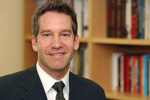 Kal Raustiala is a professor at the UCLA Law School and the UCLA International Institute. He currently serves as Associate Vice Provost for International Studies at UCLA and as the director of the UCLA Ronald W. Burkle Center for International Relations. Professor Raustiala holds a JD from Harvard Law School and PhD in political science from the University of California, San Diego.
Kal Raustiala is a professor at the UCLA Law School and the UCLA International Institute. He currently serves as Associate Vice Provost for International Studies at UCLA and as the director of the UCLA Ronald W. Burkle Center for International Relations. Professor Raustiala holds a JD from Harvard Law School and PhD in political science from the University of California, San Diego.
Professor Raustiala’s research focuses on international law and politics and on intellectual property. His recent publications include Al Maqaleh v. Gates, American Journal of International Law (2010), Toward a Post-Kyoto Climate Architecture: A Political Analysis (with Robert O. Keohane), in Joseph Aldy and Robert Stavins, eds, Implementing Architectures for Agreement: Addressing Global Climate Change in the Post-Kyoto World (Cambridge University Press, 2009), and The Piracy Paradox Revisited (with Chris Sprigman), Stanford Law Review (2009). His book about the extraterritorial reach of American law, Does the Constitution Follow the Flag?, was published by Oxford University Press in May 2009.
Professor Raustiala has been a visiting professor at Harvard Law School, Columbia Law School, Princeton University, and the University of Chicago Law School. Prior to coming to UCLA he was a research fellow in the Foreign Policy Studies Program at The Brookings Institution, a Peccei
Scholar at the International Institute for Applied Systems, and an assistant professor of politics at Brandeis University. A life member of the Council on Foreign Relations, he serves on the editorial boards of International Organization and the American Journal of International Law. He is a frequent media contributor whose writing has been featured in the New York Times, the Wall Street Journal, the Financial Times, the New Republic, the New Yorker, the International Herald Tribune and Le Monde.
***
 Jennifer Schense currently serves as an International Cooperation Adviser in the Jurisdiction, Complementarity and Cooperation Division of the Office of the Prosecutor, at the International Criminal Court, focusing in particular on the Darfur and Libya situations. She has served in the OTP since October 2004. Prior to her work at the ICC, Ms. Schense served as the Legal Adviser for the NGO Coalition for the International Criminal Court (CICC) from September 1998 until September 2004. Prior to the CICC, she served for one year as a fellow at Human Rights Watch.
Jennifer Schense currently serves as an International Cooperation Adviser in the Jurisdiction, Complementarity and Cooperation Division of the Office of the Prosecutor, at the International Criminal Court, focusing in particular on the Darfur and Libya situations. She has served in the OTP since October 2004. Prior to her work at the ICC, Ms. Schense served as the Legal Adviser for the NGO Coalition for the International Criminal Court (CICC) from September 1998 until September 2004. Prior to the CICC, she served for one year as a fellow at Human Rights Watch.
Ms. Schense received her juris doctorate, specializing in human rights, international law and conflict resolution, from Columbia Law School in 1997, and her bachelors of science in Russian language and Russian area studies from Georgetown University in 1993. She is in final stages of completing a PhD at the University of Leiden in international criminal law. Ms. Schense is originally from the United States of America.
* * *
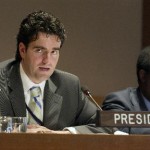 Bruno Stagno Ugarte (Costa Rica) joined Security Council Report in 2011. He concluded a sixteen year career in the Costa Rican Foreign Service including a four-year term as Foreign Minister (2006-2010). Previously, he served as Ambassador and Permanent Representative to the United Nations (2002-2006), Chief of Staff of the Foreign Ministry (1998-2000), Adviser to the Foreign Minister (1998) and Minister Counselor and Consul General in the Embassy in Paris (1994-1998). Ambassador Stagno has also served as President of the Assembly of States Parties of the International Criminal Court (2005-2008), Co-President of the Comprehensive Test Ban Treaty Conferences (2007-2009), Co-President of the UN 2005 Summit Outcome Document negotiations (2005) and Vice-President of the UN Commission of Sustainable Development (2002-2004). He is a graduate of Georgetown University (BSFS in 1991), Université de la Sorbonne (UPIII-IHEAL, DEA in 1994) and Princeton University (MPP in 2001). In addition to his native Spanish, Ambassador Stagno is fluent in English and French.
Bruno Stagno Ugarte (Costa Rica) joined Security Council Report in 2011. He concluded a sixteen year career in the Costa Rican Foreign Service including a four-year term as Foreign Minister (2006-2010). Previously, he served as Ambassador and Permanent Representative to the United Nations (2002-2006), Chief of Staff of the Foreign Ministry (1998-2000), Adviser to the Foreign Minister (1998) and Minister Counselor and Consul General in the Embassy in Paris (1994-1998). Ambassador Stagno has also served as President of the Assembly of States Parties of the International Criminal Court (2005-2008), Co-President of the Comprehensive Test Ban Treaty Conferences (2007-2009), Co-President of the UN 2005 Summit Outcome Document negotiations (2005) and Vice-President of the UN Commission of Sustainable Development (2002-2004). He is a graduate of Georgetown University (BSFS in 1991), Université de la Sorbonne (UPIII-IHEAL, DEA in 1994) and Princeton University (MPP in 2001). In addition to his native Spanish, Ambassador Stagno is fluent in English and French.
***
 Brigitte Suhr is the Director of Regional Programs at the Coalition for the International Criminal Court (CICC). In that capacity, she leads the CICC’s advocacy campaign for global support for the ICC. She and her team of experts work with national coalition members, government officials, members of parliament and the media to engage in strategic actions aimed at increasing global support for the Court through advancing universal ratification and implementation of the Rome Statute, raising awareness about the ICC and international criminal justice, as well as forming and building the capacity of national members and coalitions in key strategic countries globally.
Brigitte Suhr is the Director of Regional Programs at the Coalition for the International Criminal Court (CICC). In that capacity, she leads the CICC’s advocacy campaign for global support for the ICC. She and her team of experts work with national coalition members, government officials, members of parliament and the media to engage in strategic actions aimed at increasing global support for the Court through advancing universal ratification and implementation of the Rome Statute, raising awareness about the ICC and international criminal justice, as well as forming and building the capacity of national members and coalitions in key strategic countries globally.
Prior to this, Ms. Suhr was Counsel with the International Justice Program at Human Rights Watch where she was responsible for HRW’s ICC campaign in Latin America, the Caribbean and Southern Africa, as well as in counteracting the effects of U.S. opposition to the Court. Before that, she spent several years working in Guatemala, first as counsel to the human rights NGO, the Myrna Mack Foundation, and then as an investigator with the Guatemalan Truth Commission charged with investigating atrocities committed during that country’s 36 year armed conflict.
In the course of this work, she has engaged in fact finding and advocacy missions in more than two dozen countries around the world and has engaged in numerous radio, television and newspapers interviews in the US and globally on issues related to human rights, the fight against impunity and the ICC. Ms. Suhr holds a law degree from the University of Virginia and is a member of the New York bar.
***
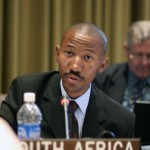 Dire Tladi holds an LLB from the University of Pretoria, an LLM from the University of Connecticut and a PhD from the Erasmus University Rotterdam. Currently Dr. Tladi serves as Legal Advisor of the South African Permanent Mission to the United Nations and member of the UN International Law Commission. He is an extraordinary professor at the Department of Public Law, University of Stellenbosch. He publishes in various areas of international law including Security Council-related and ICC-related issues.
Dire Tladi holds an LLB from the University of Pretoria, an LLM from the University of Connecticut and a PhD from the Erasmus University Rotterdam. Currently Dr. Tladi serves as Legal Advisor of the South African Permanent Mission to the United Nations and member of the UN International Law Commission. He is an extraordinary professor at the Department of Public Law, University of Stellenbosch. He publishes in various areas of international law including Security Council-related and ICC-related issues.
***
 David Tolbert is the President of the International Center for Transitional Justice (ICTJ). Previously, he served as Registrar (Assistant Secretary-General) of the Special Tribunal for Lebanon and prior to that was Assistant Secretary-General and Special Expert to the United Nations Secretary-General on United Nations Assistance to the Khmer Rouge Trials. From 2004 to 2008, Mr. Tolbert served as Deputy Chief Prosecutor of the International Criminal Tribunal for the former Yugoslavia (ICTY). He had previously been the Deputy Registrar of the ICTY and at an earlier time served at the ICTY as Chef de Cabinet to President Gabrielle Kirk McDonald and Senior Legal Adviser, Registry, serving a total of nine years at the ICTY. From 2000 to 2003 Mr. Tolbert held the position of Executive Director of the American Bar Association’s Central European and Eurasian Law Initiative, which operates rule-of-law development programs throughout Eastern Europe and the former Soviet Union. He also held the position of Chief, General Legal Division of the United Nations Relief and Works Agency for Palestine Refugees in Vienna, Austria, and Gaza.
David Tolbert is the President of the International Center for Transitional Justice (ICTJ). Previously, he served as Registrar (Assistant Secretary-General) of the Special Tribunal for Lebanon and prior to that was Assistant Secretary-General and Special Expert to the United Nations Secretary-General on United Nations Assistance to the Khmer Rouge Trials. From 2004 to 2008, Mr. Tolbert served as Deputy Chief Prosecutor of the International Criminal Tribunal for the former Yugoslavia (ICTY). He had previously been the Deputy Registrar of the ICTY and at an earlier time served at the ICTY as Chef de Cabinet to President Gabrielle Kirk McDonald and Senior Legal Adviser, Registry, serving a total of nine years at the ICTY. From 2000 to 2003 Mr. Tolbert held the position of Executive Director of the American Bar Association’s Central European and Eurasian Law Initiative, which operates rule-of-law development programs throughout Eastern Europe and the former Soviet Union. He also held the position of Chief, General Legal Division of the United Nations Relief and Works Agency for Palestine Refugees in Vienna, Austria, and Gaza.
In addition, Mr. Tolbert taught international law and human rights at the post-graduate level in the United Kingdom and practiced law in the United States. David Tolbert was Jennings Randolph Senior Fellow at the United States Institute of Peace and served as a member of the American Society of International Law Task Force on United States Policy toward the International Criminal Court (ICC) during 2008 and 2009. He has a number of publications on international criminal justice and transitional justice in the Harvard Human Rights Journal, The Fletcher Forum of World Affairs, and other journals and books. He also represented the ICTY in the discussions leading up to the creation of the ICC and the Rome Conference and served as an expert to the ICC Preparatory Committee Inter-Sessional meetings.
***
 Beth Van Schaack is Deputy to the Ambassador-at-Large for War Crimes Issues in the Office of Global Criminal Justice of the U.S. Department of State. Prior to her State Department appointment, she was Professor of Law at Santa Clara University School of Law, where she taught and wrote in the areas of human rights, transitional justice, international criminal law, public international law, international humanitarian law, and civil procedure. She has been a member of the U.S. Department of State’s Advisory Council on International Law and served on the United States interagency delegation to the International Criminal Court Review Conference in Kampala, Uganda, in 2010. For the academic year 2009-2010, she was a Visiting Scholar with the Center on Democracy, Development and the Rule of Law at Stanford University. She is the author of several books and articles on human rights, the law of armed conflict, and international criminal law, including a leading textbook in the latter field with Foundation Press.
Beth Van Schaack is Deputy to the Ambassador-at-Large for War Crimes Issues in the Office of Global Criminal Justice of the U.S. Department of State. Prior to her State Department appointment, she was Professor of Law at Santa Clara University School of Law, where she taught and wrote in the areas of human rights, transitional justice, international criminal law, public international law, international humanitarian law, and civil procedure. She has been a member of the U.S. Department of State’s Advisory Council on International Law and served on the United States interagency delegation to the International Criminal Court Review Conference in Kampala, Uganda, in 2010. For the academic year 2009-2010, she was a Visiting Scholar with the Center on Democracy, Development and the Rule of Law at Stanford University. She is the author of several books and articles on human rights, the law of armed conflict, and international criminal law, including a leading textbook in the latter field with Foundation Press.
Prof. Van Schaack joined the Santa Clara faculty from private practice at Morrison & Foerster LLP. While in private practice, Prof. Van Schaack practiced in the areas of commercial law, intellectual property, international law, and human rights. Prior to entering private practice, Prof. Van Schaack was Acting Executive Director and Staff Attorney with The Center for Justice & Accountability, a non-profit law firm in San Francisco dedicated to the representation of victims of torture and other grave human rights abuses in U.S., international, and foreign tribunals. She was also a law clerk with the Office of the Prosecutor of the International Criminal Tribunal for the Former Yugoslavia.
Prof. Van Schaack is a graduate of Stanford University and Yale Law School.
***
 Christian Wenaweser has served as Permanent Representative of Liechtenstein to the United Nations since 2002. From 2008 to 2011, Ambassador Wenaweser served as President of the Assembly of States Parties to the Rome Statute of the ICC, and in June 2010 served as President of the Review Conference of the Rome Statute in Kampala Uganda. He has served in numerous roles in New York, including as co-facilitator of the review of the Human Rights Council in 2010-2011 and and Chairman of the UN’s Third Committee (Social, Humanitarian and Cultural). Mr. Wenaweser previously served as Counsellor and Deputy Permanent Representative and desk officer in the Office of Foreign Affairs of Liechtenstein from 1992 with responsibility for the United Nations (Human Rights, Disarmament and International Law).
Christian Wenaweser has served as Permanent Representative of Liechtenstein to the United Nations since 2002. From 2008 to 2011, Ambassador Wenaweser served as President of the Assembly of States Parties to the Rome Statute of the ICC, and in June 2010 served as President of the Review Conference of the Rome Statute in Kampala Uganda. He has served in numerous roles in New York, including as co-facilitator of the review of the Human Rights Council in 2010-2011 and and Chairman of the UN’s Third Committee (Social, Humanitarian and Cultural). Mr. Wenaweser previously served as Counsellor and Deputy Permanent Representative and desk officer in the Office of Foreign Affairs of Liechtenstein from 1992 with responsibility for the United Nations (Human Rights, Disarmament and International Law).
Ambassador Wenaweser attended diplomatic training at the Ministry of Foreign Affairs in Berne, Switzerland (1991-1992). He also undertook a special training course for Swiss and Liechtenstein diplomats at the Institut Universitaire des Hautes Etudes Internationales in Geneva, Switzerland, as well as Spanish language studies in Barcelona, Spain, during the same period. Between 1989 and 1990, he went on a scholarship of the Swiss National Foundation, Bayerische Akademie der Wissenschaften, Munich, Germany, studying filmmaking, French literature and philosophy. Earlier, he was a teaching assistant in Greek literature at Zurich University, and studied Italian in Rome, Italy. Also, in 1987 he was a licentiate at Zurich University in Greek literature, linguistics, Latin literature and philosophy.
Born on 16 November 1963 in Zurich, Switzerland, he speaks English, French, Spanish and Italian, besides his mother tongue German.
* * *
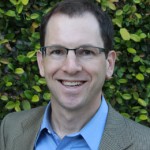 Christopher Whytock is Professor of Law and Political Science at the University of California, Irvine, and a faculty affiliate of the UCI Center in Law, Society and Culture and the John & Marilyn Long U.S.-China Institute for Business and Law. He has taught courses on international law, international relations, foreign relations law, civil procedure, and business associations. His research focuses on transnational litigation, conflict of laws, international law, and the role of domestic law and domestic courts in global governance. His scholarship has appeared in law journals including Columbia Law Review, Cornell Law Review and New York University Law Review, and peer-reviewed social science journals includingInternational Security.
Christopher Whytock is Professor of Law and Political Science at the University of California, Irvine, and a faculty affiliate of the UCI Center in Law, Society and Culture and the John & Marilyn Long U.S.-China Institute for Business and Law. He has taught courses on international law, international relations, foreign relations law, civil procedure, and business associations. His research focuses on transnational litigation, conflict of laws, international law, and the role of domestic law and domestic courts in global governance. His scholarship has appeared in law journals including Columbia Law Review, Cornell Law Review and New York University Law Review, and peer-reviewed social science journals includingInternational Security.
Professor Whytock previously taught at the University of Utah College of Law and practiced law as an associate at O’Melveny & Myers LLP and Paul, Hastings, Janofsky & Walker LLP. He received his Ph.D. in political science from Duke University; his J.D. and M.S. in Foreign Service from Georgetown University, where he was a Ford Foundation Fellow in Public International Law; and his B.A. in political science from UCLA.
***
 Joel Wuthnow is a research analyst at CNA, a federally-funded research institute in Alexandria, Va. A specialist in Chinese foreign and security policy, he is the author of Chinese Diplomacy and the U.N. Security Council (Routledge, 2012) and China-related articles in several academic journals. He has held fellowships in the China & the World Program at Princeton University and at the Brookings Institution, and received his Ph.D. in Political Science from Columbia University.
Joel Wuthnow is a research analyst at CNA, a federally-funded research institute in Alexandria, Va. A specialist in Chinese foreign and security policy, he is the author of Chinese Diplomacy and the U.N. Security Council (Routledge, 2012) and China-related articles in several academic journals. He has held fellowships in the China & the World Program at Princeton University and at the Brookings Institution, and received his Ph.D. in Political Science from Columbia University.
***
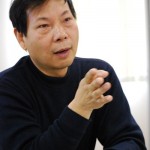 ZHU Wenqi served from 1988 to 1994 in the Department of Treaty and Law of the Chinese Foreign Mnistry, including as Deputy Director in the Division of International Public Law, which deals with all legal matters in the United Nations, including those in the GA and SC as well as those in relation to international criminal instituts. From 1994 to 2001, Mr. Zhu served in the International Criminal Tribunal for the Former Yugoslavia and that for Rwanda, firstly as Legal Assistant of the Judges in the Chambers and then as Appeals Counsel in the Office of the Prosecutor. Since 2002, Professor Zhu has been a Professor of International Law at Renmin University of China, Beijing, China, where he is also Director of the Institut of International Criminal Law. He is the author of China and the International Criminal Court (2008); International Criminal Law (2009), and War Crimes (2010), among other works.
ZHU Wenqi served from 1988 to 1994 in the Department of Treaty and Law of the Chinese Foreign Mnistry, including as Deputy Director in the Division of International Public Law, which deals with all legal matters in the United Nations, including those in the GA and SC as well as those in relation to international criminal instituts. From 1994 to 2001, Mr. Zhu served in the International Criminal Tribunal for the Former Yugoslavia and that for Rwanda, firstly as Legal Assistant of the Judges in the Chambers and then as Appeals Counsel in the Office of the Prosecutor. Since 2002, Professor Zhu has been a Professor of International Law at Renmin University of China, Beijing, China, where he is also Director of the Institut of International Criminal Law. He is the author of China and the International Criminal Court (2008); International Criminal Law (2009), and War Crimes (2010), among other works.
